
Sulekha Inks – scripting India’s success story since 1934
There used to be a time when no Bengali Bhadrolok (gentleman, of refined stock, the lettered variety) was complete without the de rigueur fountain pen in his shirt pocket. And nine out of ten, I guess, had Sulekha ink in them. The school boys with their ink-stained fingers and the ink blotch on the shirt pocket that was a kind of badge of honour to the academically inclined Bengali? That too, was Sulekha. The ladies who carried their pens in their purses (Vanity bags, as they were called in those days of yore)? Yes, they too were Sulekha. Government Offices, business establishments, hospitals, police stations… there was no place where the fountain pen was a persona non grata and by default, no place where the Sulekha ink had not left its indelible mark!
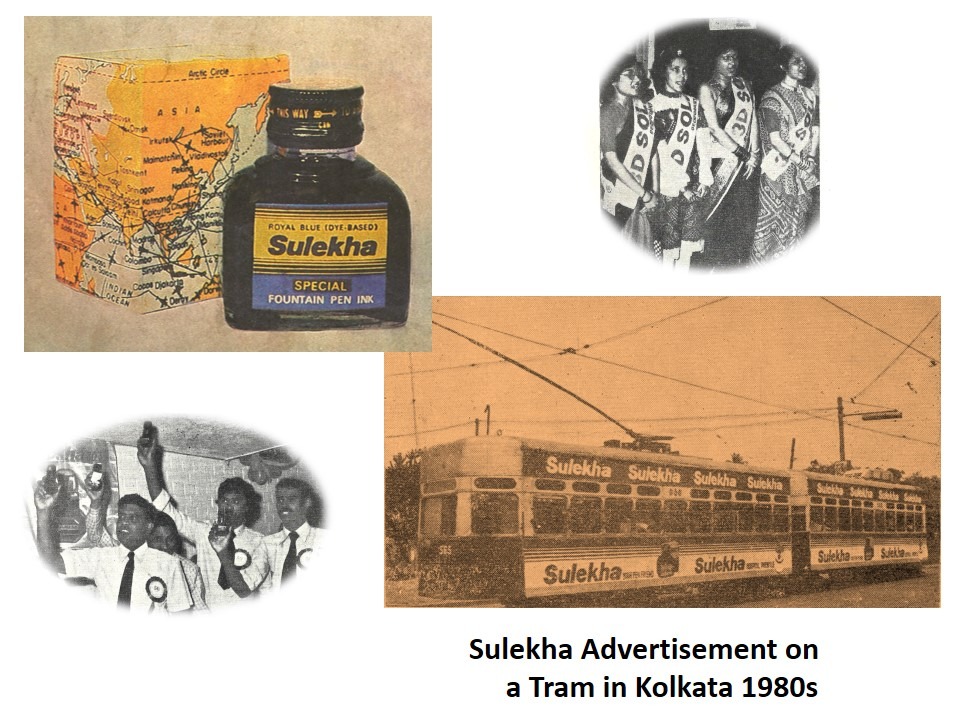
Little wonder, there is a place called Sulekha in Kolkata, where once stood the factory of the ink company – a feat that even the global majors cannot match. And talking of feats, I guess, being named by a noble laurate (the brand was christened “Sulekha” by none other than the bard of Bengal, Rabindranath Tagore, though the more probable, but less romantic possibility is that the name was coined by Satish Chandra Das Gupta, freedom fighter, who had, on the request of Mahatma Gandhi prepared the first swadeshi ink, “Krishnadhara”, the formulation of which was given by him to the Maitra brothers, for further development, from which had flown the indelible Sulekha) is another that is virtually unassailable. Oh, the company had even offered technical assistance to the first ink factories and help set them up in faraway Africa, that too through a global tendering process supervised by the United Nations.
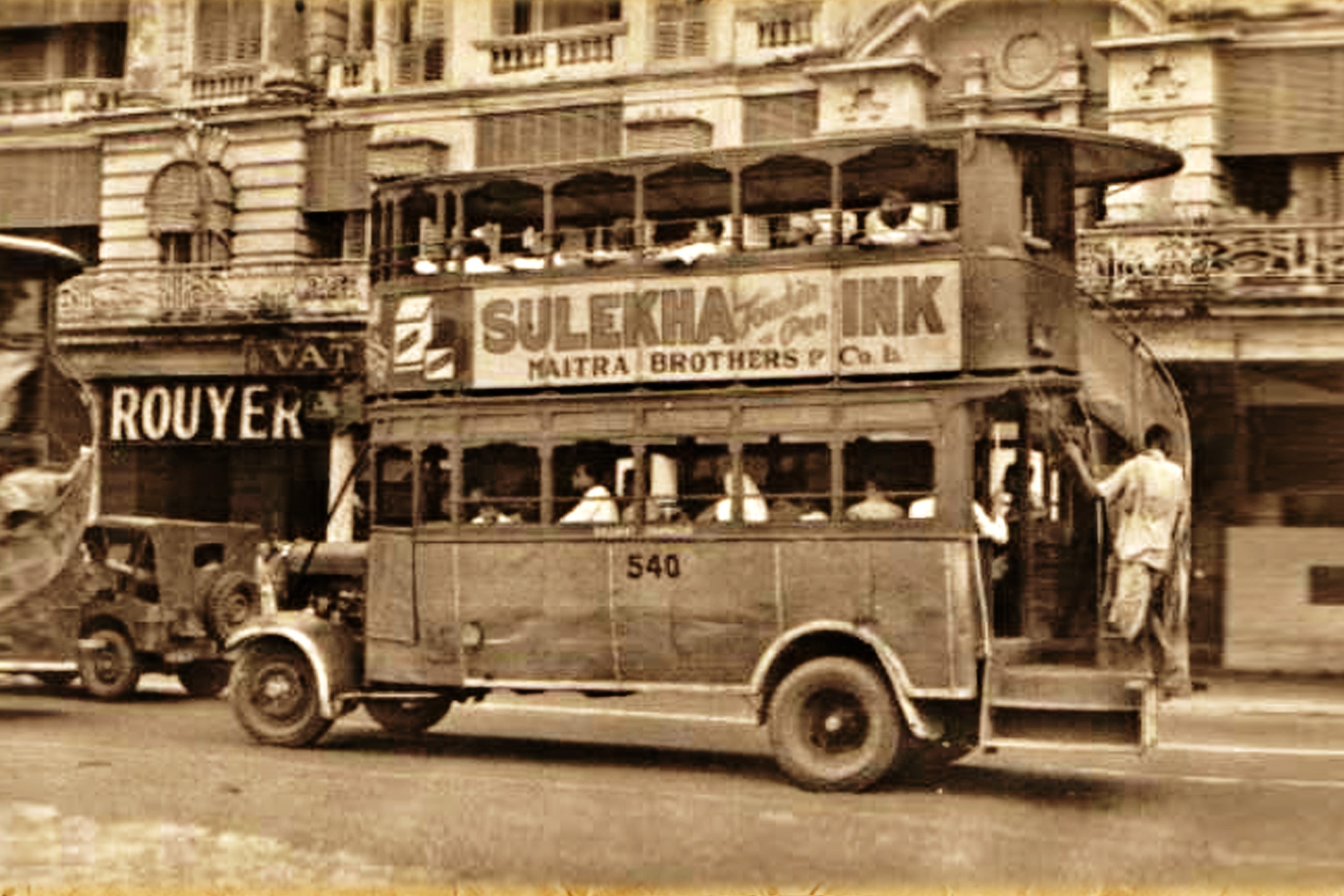
Not a mean feat, considering the humble beginnings of Sulekha – which was the original “start-up” as start-ups go, only, there was no garage a-la Microsoft. As for “women’s empowerment”, another cliché that is in vogue these days, the entity was started in 1934 in Rajshahi (Bangladesh) with inks made primarily by ladies: Purnima, Urmila & Kalpana – wives and sister-in-laws of Nanigopal and Sankaracharya Maitra who were the first hawkers, selling their ware door to door.
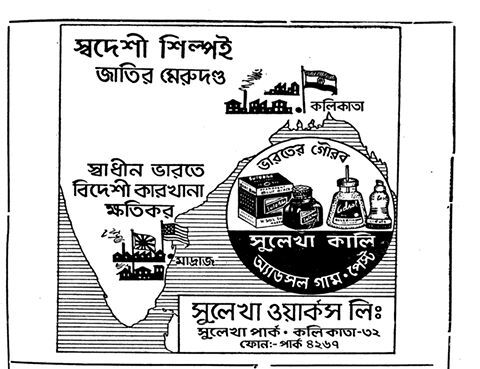
Ambica Charan Maitra and Satyabati Debi, Nanigopal and Sankaracharya’s parents, who had not only given their life’s savings to finance the fledgling swadeshi enterprise, were also involved, hands on, in the manufacture of the ink and it was their resolve that the company honours till date – to provide the best products at the cheapest possible price. “Family Enterprise” and “inclusive pricing” for those in the lookout for more clichés.
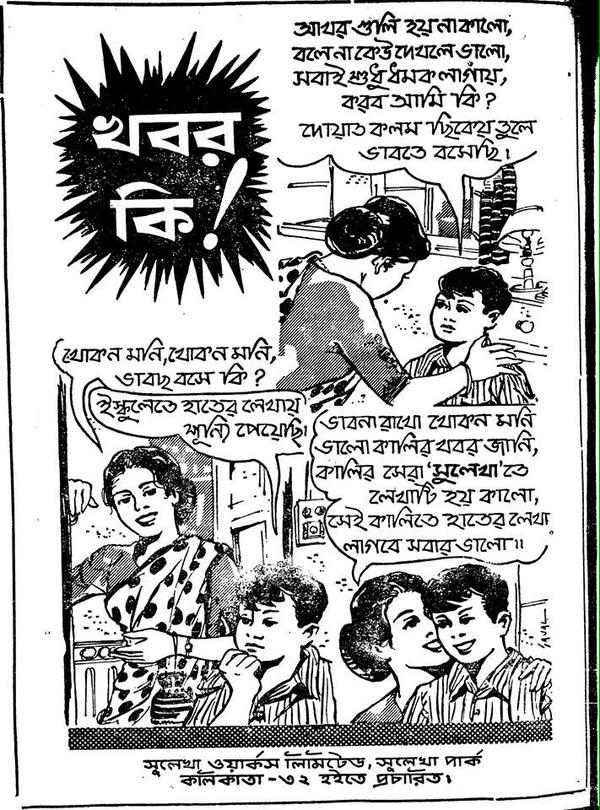
The shift to Calcutta was logical and the first foray into the city was from Bowbazar. Shortly thereafter, a new set-up was hired at Kasba in South Kolkata. Success must have been inked pretty early, for they soon bought a farmhouse in Jadavpur which was then in the fringes of the city, where the factory was set up. Another factory was to follow in Sodepur region, while the company’s forays into the North Indian market was spearheaded from a factory in Gaziabad. It will not be out of place to mention here that there used to be time when Sulekha alone used to sell more ink in India than the rest of the manufacturers (and importers) put together. Sulekha inks were highly regarded and regularly exported to the Far East, the Middle East, Europe and Australia, that too, braving the constant flip-flop of Government policies that often made the company vulnerable to competition from cheaper imports of qualitatively inferior products.
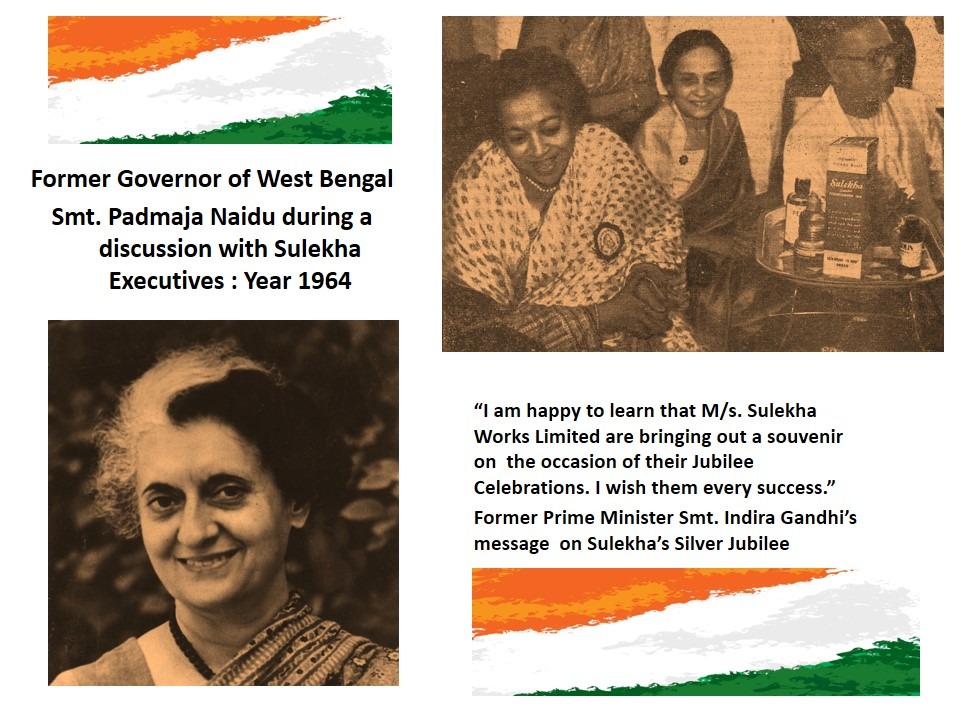
As for Swadeshi and Nationalism, yes, Sulekha was a response to Mahatma Gandhi’s clarion call to replace imperial imports by embracing self-reliance. Legend has it that Dr Bidhan Chadra Roy, the Chief Minister of the state post-independence, was not only a patron of Sulekha’s inks, but was also an indulgent supporter of the homegrown enterprise’s growth pangs. Buddhadev Bhattacharyya, another Chief Minister of the state, a known wielder of the fountain pen himself, was also enamoured with the brand and it was during his tenure that Sulekha, after a near death experience following the steady depletion of its market due primarily to the constant stabs of the ballpoints, and Sulekha’s stubborn refusal to rationalise its workforce (read “fire” the hundred and fifty odd refugees it had adopted in its workforce post Partition) to access the much needed infusion of Bank finance, tried to gasp for the breath of life. Contrary to popular belief, Sulekha was not forced to down shutters due to militant trade unionism – Sulekha workers were partners in progress, stakeholders in the company way before the rest of India had even understood the true purport of the term. The forced closure was more due to, to use another cliché, “circumstances beyond the control of the management”.
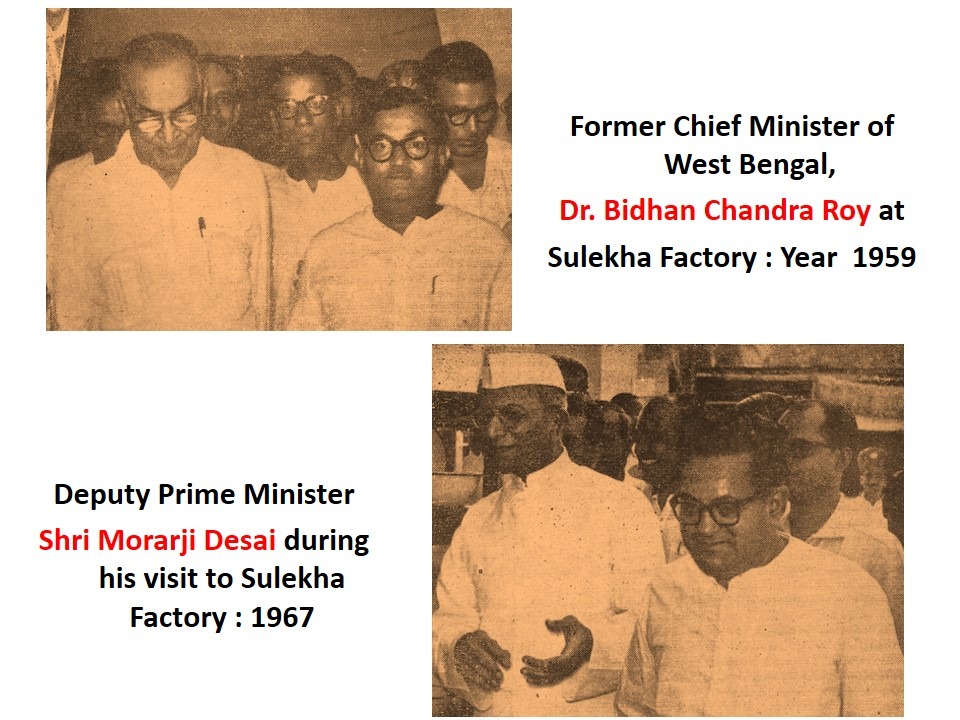
Today, Sulekha has sold off much of its assets and has paid off all its dues. Changing with times, Sulekha has already curved a distinct niche for itself as a provider of Solar power solutions, apart from diversifying into a line of Home Hygiene Products that are very well accepted in the market. A move into printer inks has also paid off, thanks largely to the inhuman efforts that have been put in by the team led by Kalyan Kumar Maitra, the octogenarian Chairman of the Company.
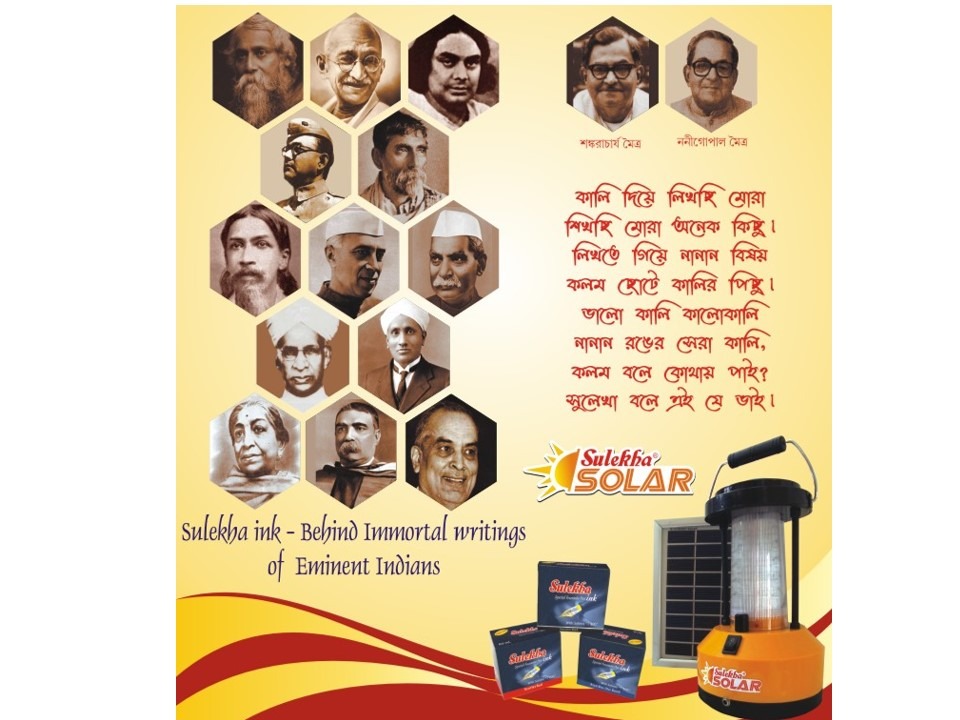
With the flanks secured now under the leadership of Kaushik Maitra, Sulekha’s Managing Director, Sulekha is all set to rededicate its energies to do what the Maitra brothers had originally set out to achieve – make the ink that will write independent India’s forays forward, to fame and fortune.
Watch this space, Sulekha is not only alive and kicking, but is raring to go!
For more information visit the Sulekha website: www.sulekhaink.co.in

I still visit this place for inks. They have lots of varieties and the quality is still very worthy.
Where I can buy Sulrkha ink.
Sulekha’s the bank details are given in the story. please make your deposit and forward the relevant information to the email id that is provided. the company will directly ship the ink
I was introduced to Sulekha pen and inks at school. Still i have their newer models of pens and some ink variants. Sadly it is not available everywhere in the market.
Dear Chawm,
Many thanks for the inspirational Sulekha story. What a fine example of business expansion and brand building, even today after decades of their unfortunate closure due to unfortunate circumstances, many people recall the brand fondly which has so deeply etched in their hearts and minds. This should become a good Indian case study in Business Schools. I hope small time and startup Indian Pen, ink & Stationery companies learn at least what is Brand Building from Sulekha to leave an indelible mark in their business. I am happy that Sulekha is now alive and kicking, I would like to see Sulekha as an example of “Rising like a Phoenix from the Ashes!” Please convey my good wishes to them.
Sulekha ink was well-known, yes, but not readily available in the South. We used to see small advertisements regularly in the newspaper. It was a good example of national enterprise, rising to great heights.
The call to nationalist enterprises was first given NOT BY MAHATMA GANDHI, BUT BY SRI AUROBINDO. It was Sri Aurobindo who first talked of Passive Resistance ( Non-Cooperation) , Boycott ( of British goods) and encouragement and patronage to national enterprises and industries during the agitation against Bengal Partition in 1905. The Nationalists were so successful then that the partition was annulled. Gandhi, who came on the scene nearly 15 years later simply took the idea from Sri Aurobindo without acknowledgement.
Now, the problems with nationalist enterprises are two fold:
1. They do not understand and assess the business situation as it develops.(failure of SWOT)
2. The change of technology and its impact.
But the old generation of our national entrepreneurs were also humane- they were not mere greedy businessmen out to make quick money. Sulekha is one of our finest brands, nurtured with blood , sweat , toil and tears. All over the world, there is a revival in the fountain pen and consequently ink industry. Sulekha should make use of the opportunity to rise again . It is a respected Indian brand.
Many years ago, I used to see advertisements for “Sulekha” and “Briefman” pens. I presume these also belonged to them. The student pen market is booming! Sulekha should also play its part.
I wish the promoters all the best.
sir, i am forwarding your comment to the Sulekha management. Thank you so very much for writing in. it is comments like these that make all the efforts worth their while . Thank you again.
Chawmda,
Sulekha is open to distribution tie ups. Please let it be known that proposals can be discussed with details such as planned markets to service, tentative volume to start with ( we know its not the same anymore) and forward plans. Please share the information also that Sulekha also has a whole range of domestic cleaning products such as Phenyls ( citronella, Camphor and Pine Oil variants) toilet cleaners, modified muriatic acid, liquid handwash, dishwashing liquid doubling up as gas oven cleaners ( not easy), bleaching powder, aqua based room freshener and broad spectrum mosquito repellant…Sulekha needs partners to bring back the glorious days and atmanirbhar Bhrata can be a reality again.
Thanks.
This is great news. I hope they start selling the ink online and it’s available to people across the globe. 🙂
Sir,
Can i get a pack of HATE KHARI , a packet containing a fountain pen & ink and copies of bengali swar barna & byanjan barna from your sulekha showroom in jadavpur or you suggest any other shop in kolkata. I already collected your Three ink Heritage pack, but could not get the information when it launched or where it can be found at a price of Rs 100.
you can contact Kaushik Maitra directly : ink.sulekha@gmail.com or at order@sulekhaink.co.in